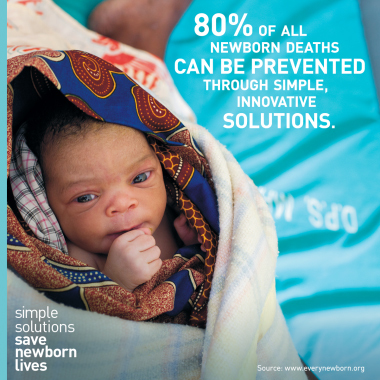At this year’s 67th annual World Health Assembly (WHA) in Geneva, Switzerland, the assembly adopted the Every Newborn Action Plan, pledging to reduce the number of deaths among newborns – which is close to 3 million per year – including those exposed to HIV.
The ambitious plan aims to end preventable newborn deaths by 2035, and paves the way for the launch of the final Every Newborn Action Plan in Johannesburg on June 30, 2014. More than 50 countries took to the floor of the Assembly during the debate to express their support.
High-level government officials and representatives of civil society and United Nations (UN) agencies also gathered to assess progress of the Global Plan towards the Elimination of New HIV Infections among Children by 2015 and Keeping their Mothers Alive (Global Plan). The meeting was an opportunity for ministers of health to review global and country-level progress on preventing mother-to-child transmission of HIV (PMTCT) and ensuring that mothers and infants have access to the HIV care and treatment they need to live healthy lives.
Opening the event, Michel Sidibé, executive director of UNAIDS, said the global health community should celebrate because joint concerted efforts prevented more than 800,000 babies from being born with HIV.
“It is important to not just identify our successes but also the challenges we still face and the resources we need to remove them,” said Sidibé.
“We need a new paradigm – we should not just think about how we can reach more children, but make sure we produce better drugs, fast-track diagnosis and treatment, and change drug regimens to make it easier for children to adhere to treatment,” he added.
Participants noted that though progress has been made, we are still failing children living with HIV. Of the 2.6 million children living with HIV in the 21 priority countries in Africa targeted for scale-up under the Global Plan, only 23 percent were on treatment in 2013, which is woefully inadequate.
“We have demonstrated to the skeptics that it is possible to scale up services rapidly to save children – but we have also shown that stopping mother-to-child transmission of HIV is not just about HIV, but about transforming health systems and starting new and important partnerships between civil society and government,” Sidibé said. “If we can quickly achieve the results we need in countries falling behind, like Nigeria and the Democratic Republic of the Congo, then we can truly say to the world that we will soon be able to see a new generation born without HIV.”
To learn more about EGPAF’s commitment to an AIDS-free future be sure to watch our video.




